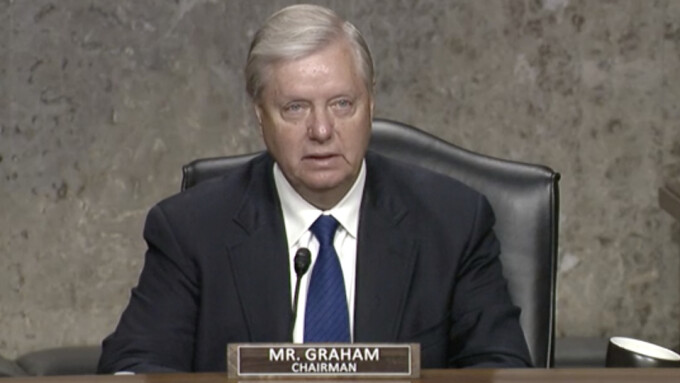WASHINGTON — After scheduling and facilitating a lengthy, largely pointless debate on Section 230 this morning at the Committee on the Judiciary, which he chairs, Senator Lindsey Graham (R-S.C.) withdrew his S. 4632 bill — the ”Online Content Policy Modernization Act” — from consideration.
Graham had scheduled the hearing for this morning to vote on S. 4632, which he introduced in September to repeal Section 230 protections for online platforms that depend on user-uploaded content.
News site Politico reported earlier that “the committee was expected to vote today on Graham’s [S. 4632] bill to both weaken Section 230 and amend copyright law.”
“Consideration of the proposal, which combines a bipartisan copyright bill with a GOP-led effort to target the tech industry’s liability shield over allegations of bias, has been repeatedly tabled,” Politico continued, adding that last night, “the panel posted a series of amendments it expects to consider today.”
The official committee website lists 13 amendments to Graham’s original bill, introduced by Senators Lee, Kennedy, Hirono, Hawley, Graham, Durbin, Booker and Blumenthal.
A Pointless, Performative Debate
Today, after presiding over what Section 230 experts are calling a “largely performative debate,” Graham withdrew the bill from consideration and said he had achieved his goal, which was merely to have a debate on reforming or repealing the legislation.
Graham essentially admitted he knows S. 4632 will not move forward this year; congressional analysts pointed out that Graham will not be committee chair next year, a powerful position that will likely go to either Sen. Chuck Grassley (R-Iowa) or to a Democrat, depending on the result of the Georgia runoff elections in January.
Graham also announced today's hearing was the last “markup” hearing for 2020, so S. 4632 appears to be dead for the current Congress.
Legal experts consulted by XBIZ summarized the progress of S. 4632 as “Graham rescheduling hearings eight times [and] wasting countless taxpayer dollars, merely to have today’s debate about Section 230 and then throw the bill out at the end.”
Graham's 'Objective Reasonable Belief' Notion
As XBIZ reported, Graham's S. 4632, which explicitly sought to undermine the First Amendment based on a new notion of "objectionally reasonable belief," included a change of wording that attempted to single out "material that the provider or user has an objectively reasonable belief is obscene, lewd, lascivious, filthy, excessively violent, harassing, or promoting self-harm, promoting terrorism or unlawful, whether or not such material is constitutionally protected.”
The Online Content Policy Modernization Act was another attempt by Graham to reform or revoke Section 230 protections, the so called “First Amendment of the internet.” A previous Graham sponsored bill, the EARN IT Act, also aimed at Section 230, is making its way through the Senate, as are a few other proposals that Graham has praised.
Both Donald Trump and Joe Biden have expressed their wish to repeal Section 230; Trump issued a confusingly worded Executive Order in May that ordered federal agencies to find ways to challenge its protections.
According to the U.S. Constitution, only Congress has the power to alter or repeal Section 230.
A New Copyright Bureaucracy
Graham’s new Online Content Policy Modernization Act, which he previously called Online Freedom and Viewpoint Diversity Act, also stated its purpose to "establish an alternative dispute resolution program for copyright small claims, to amend the Communications Act of 1934 to modify the scope of protection from civil liability for ‘good Samaritan’ blocking and screening of offensive material, and for other purposes.”
Graham’s bill proposed the creation of a new federal bureaucracy under the Copyrights Office, the Copyright Claims Board. Graham’s new board would supposedly “serve as an alternative forum in which parties may voluntarily seek to resolve certain copyright claims regarding any category of copyrighted work, as provided in this chapter.”
This new form of government intervention would essentially tie user-uploaded content sites, from Facebook and Twitter to YouTube and adult tube sites, in endless litigations arbitrated by this new, politically appointed board.
A Smörgåsbord of Proposals
Graham's S. 4632 was merely one in a smörgåsbord of proposals, all of them proposing to curtail free speech online and digital rights in the name of various causes. Attacks on Section 230 picked up steam earlier this summer as Trump became enraged by attempts by social media platforms to moderate his messaging and that of his eldest son and other followers.
None of these proposals are identical, and all of them prioritize the specific interests of their sponsors, from Graham’s insistence in creating a new government bureaucracy to make decisions about specific instances that do, or do not, deserve protection from liability, to the folksy cluelessness of Senator John Kennedy’s bizarre obsession with mind control and manipulation, to the more bipartisan PACT Act, which many observers consider the adults-in-the-room option among this colorful carnival of election-year legislative ingenuity.








